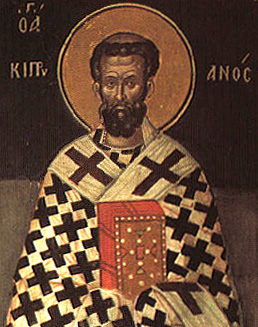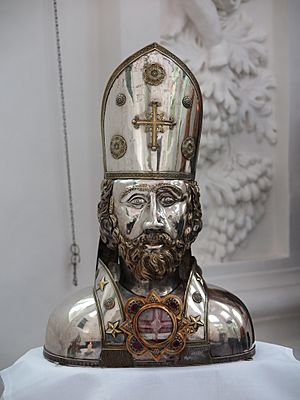Cyprian facts for kids
Quick facts for kids Cyprian |
|
|---|---|
| Bishop of Carthage | |
 |
|
| See | Carthage |
| Appointed | 248 or 249 AD |
| Reign ended | 14 September 258 AD |
| Predecessor | Donatus I |
| Successor | Carpophorus |
| Personal details | |
| Born | c. 210 Carthage, Roman Empire |
| Died | 14 September 258 Carthage, Roman Empire |
| Sainthood | |
| Feast day | 16 September (Catholic Church, Western Orthodox, and Lutheran) 31 August (Eastern Orthodox) 13 or 15 September (Anglican) 14 September (historical Sarum Use) |
| Venerated in | Catholic Church Oriental Orthodox Churches Eastern Orthodox Church Lutheranism Anglicanism |
| Patronage | North Africa, Berbers |
Cyprian (/ˈsɪpriən/; Latin: Thaschus Caecilius Cyprianus; c. 210 – 14 September 258 AD) was an important bishop of Carthage and an early Christian writer. He was from a Berber family in North Africa. Many of his Latin writings still exist today. He is honored as a saint in both Western and Eastern Christian churches.
Cyprian was born around the year 210 AD in North Africa, possibly in Carthage. He received a good education there. Soon after he became a Christian, he was chosen as a bishop in 249 AD. He faced many challenges during his time. His strong leadership, firm actions during a Christian disagreement called the Novatianist heresy, and his help during a terrible sickness (the Plague of Cyprian) made him famous. He was eventually killed for his faith, which is called martyrdom. This proved his holiness to the Church.
Because he was a skilled writer in Latin, he was considered one of the most important Latin Christian writers. This was true until Jerome and Augustine came along much later.
Contents
Cyprian's Early Life
Cyprian was born into a wealthy family in Carthage around the early 200s AD. His first name was Thascius. He later added the name Caecilius to honor the priest who helped him become a Christian. Before he converted, Cyprian was a well-known lawyer and a teacher of public speaking in Carthage.
He became a Christian and was baptized when he was about 35 years old, around 245 AD. After his baptism, he gave a large part of his money to the poor people of Carthage. This was a generous act for someone of his high social standing.
In the early days of his new faith, he wrote some works. These writings were similar to those of Tertullian, who was a big influence on Cyprian's writing style and ideas.
Becoming Bishop of Carthage
Not long after his baptism, Cyprian became a deacon and then a priest. Between 248 and 249 AD, he was chosen to be the bishop of Carthage. Many poor people liked this choice because they remembered his kindness and generosity. However, some older church leaders in Carthage were not happy with how quickly he rose through the ranks. This disagreement continued during his time as bishop.
Soon after, the Christian community faced a big challenge. Christians in North Africa had not been persecuted for many years. The Church had become comfortable and perhaps a bit careless. In early 250 AD, the Decian persecution began. Emperor Decius ordered everyone in the Empire to make sacrifices to the Roman gods. Jewish people were allowed to be exempt from this rule.
Cyprian decided to go into hiding instead of facing possible death. Some church leaders thought this was a sign of fear. But Cyprian explained that he fled so he would not leave his followers without a leader during the persecution. He said that leading them from a distance was God's will. He also pointed out that even the Apostles and Jesus himself had sometimes moved away from danger.
Facing Persecution Under Valerian
In late 256 AD, a new persecution against Christians started under Emperor Valerian. Pope Sixtus II was killed in Rome.
In Africa, Cyprian prepared his people for the expected new rules against Christians. He wrote a book called De exhortatione martyrii (On the Exhortation to Martyrdom). He set an example when he was brought before the Roman governor, Aspasius Paternus, on August 30, 257 AD. Cyprian refused to sacrifice to the pagan gods and bravely declared his faith in Christ.
The governor sent him away to Curubis, which is now called Korba. There, Cyprian did his best to comfort his followers and other church leaders who had also been sent away. He believed he had a vision that showed him his own death was near. After a year, he was called back. He was kept almost like a prisoner in his own home. This was because a new, stricter order from the emperor had arrived. Christian writers later said this order demanded that all Christian leaders be executed.
On September 13, 258 AD, Cyprian was put in prison. This was ordered by the new governor, Galerius Maximus. The official questioning of Cyprian by Galerius Maximus on September 14, 258, has been recorded.
Cyprian was executed right away in an open area near the city. A huge crowd followed him on his final journey. He took off his clothes by himself, knelt down, and prayed. After he blindfolded himself, he was killed by a sword. Christians buried his body near the place where he died.
After Cyprian's death, eight of his followers in Carthage were also killed for their faith.
Cyprian's Writings
Cyprian's works are collected in large books. He was not a deep thinker about complex religious ideas. Instead, his writings were always connected to his work as a church leader. His first major work was a talk given to a friend called Ad Donatum. In it, he described his own journey to Christianity. He also talked about the problems in the Roman government and the gladiatorial games. He pointed to prayer as the main comfort for Christians.
Another early work was the Testimonia ad Quirinum. While he was away from Carthage, Cyprian wrote his most famous book, De Ecclesiae Catholicae Unitate (On the Unity of the Catholic Church). When he returned, he wrote De Lapsis (On the Fallen). This book was about Christians who had given up their faith during persecution. Another important work is his Treatise on the Lord's Prayer. We likely only have some of his writings, especially his letters. About sixty of his letters still exist, along with some letters he received.
Cyprian of Carthage is sometimes confused with Cyprian of Antioch. Cyprian of Antioch was said to be a magician before he became a Christian. Because of this confusion, some magic books are wrongly thought to be written by Cyprian of Carthage.
About His Life
Pontius the Deacon wrote a book about Cyprian called The Life and Passion of St. Cyprian. This book tells about Cyprian's early life, how he became a Christian, his important actions, and his death under Emperor Valerian.
His Beliefs
Sacraments
Cyprian believed that babies should be baptized. He also thought that babies should receive communion. However, he did not believe that baptisms performed by groups outside the main Church were valid. He insisted that these people needed to be baptized again. He also believed that the special bread and wine of the Eucharist could not be properly blessed outside the Church.
Cyprian was one of the first important Christian leaders to clearly state that salvation happens through water baptism. He believed that while God's grace gives all saving power, baptism is the way God makes a person "born again." This means receiving a new life and leaving behind their old ways. He thought that the "water of new birth" gave new life through the Holy Spirit working in it.
The Church
Cyprian believed that Christians who had given up their faith during persecution could be allowed back into the Church after they showed they were sorry. He was against the Novatians, who believed these people should never be allowed back.
Cyprian believed that every bishop holds a position similar to that of Saint Peter. However, he also believed that the church in Rome (Peter's see) was the direct heir of Peter. Cyprian thought that all the apostles were equal. He also believed that all bishops followed the apostles in their leadership roles.
Honoring Cyprian
Churches were built over Cyprian's tomb and where he died. However, these churches were later destroyed by the Vandals. The burial places of saints like Cyprian became seen as special "contact points between Heaven and Earth." They became important centers for new Christian communities in cities. A sermon from Augustine about Cyprian's feast day shows that many people honored him throughout Africa by the 300s AD.
It is said that Charlemagne had Cyprian's bones moved to France. Cities like Lyons, Arles, Venice, Compiègne, and Roenay in Flanders have all claimed to have parts of the saint's remains.
The Catholic Church celebrates his feast day on September 16, along with his good friend Pope St. Cornelius. In the Middle Ages, some Catholic traditions honored him on September 14, the day he died. The Eastern Orthodox Church remembers him on August 31. Lutherans now celebrate him on September 16. Anglicans usually celebrate his feast on September 13 or 15.
See also
In Spanish: Cipriano de Cartago para niños
 | Laphonza Butler |
 | Daisy Bates |
 | Elizabeth Piper Ensley |


